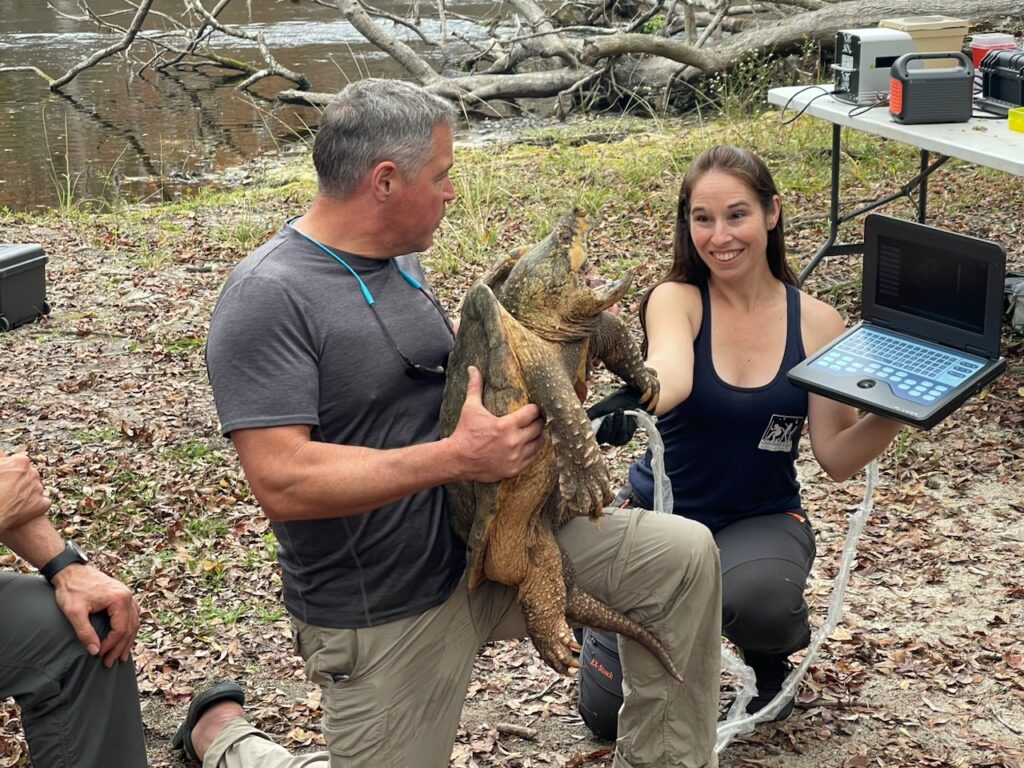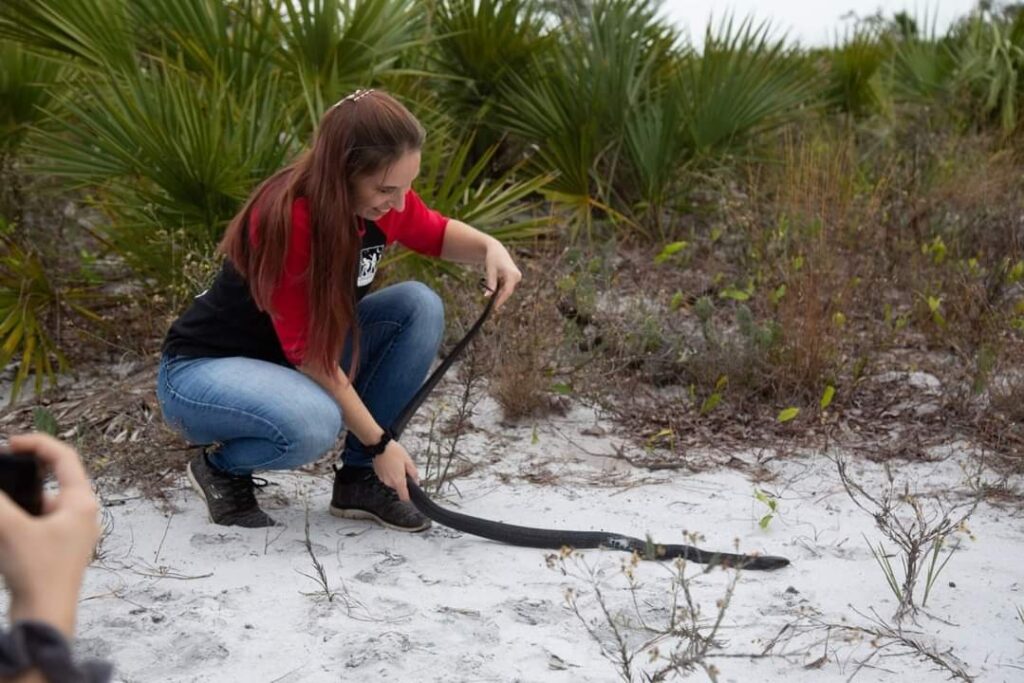By Kristan Reynolds
They call her “Swamp Girl.”
While most children are drawn to furry mammals like puppies or kittens, Kim Titterington had an affinity for more scaly, slimy creatures.
Growing up, Titterington adored the softshell turtles in her backyard pond. She said she had names for each turtle and that they would always follow her boat around the pond.
Now, at the age of 43, Titterington has her own nonprofit organization based in her hometown of Kissimmee: Swamp Girl Adventures, dedicated to rehabilitating and conserving reptiles and amphibians.
Whether it’s a common snapping turtle struck by a vehicle or a corn snake with an abscess, Titterington, a licensed wildlife rehabilitator and research coordinator, is on the case. She founded the organization in 2009, and it operates throughout 28 Florida counties.

Titterington also does in-person outreach at Florida festivals and schools to teach about wildlife and the environment; however, much of her educational outreach can be found online. Titterington posts videos of rehabilitation efforts and releases on various social media platforms, such as TikTok, Instagram and YouTube. The Swamp Girl Adventures website also offers information on Florida wildlife.
“When I do my education, I try to show that a little tenderness goes a long way,” Titterington said. “You can treat them with respect, and you get the same back.”
While Titterington is able to do a lot of her education through social media, she says in-person outreach can be much more difficult as she has to travel to different locations since the organization does not currently have a facility.
Without a facility, Titterington has to accommodate the reptiles and amphibians she cares for in her own home. This means fitting around 30 to 40 animals in her home during slow season, and more than 100 animals during busy season, which lasts from spring into early fall, according to Titterington.
“We have sacrificed every bit of space we possibly can in our home,” Titterington said. “We need to build a facility to handle the load that has been coming in, and it goes up every year.”
Titterington said the most common issue she encounters is animals that are hit by cars; however, she also deals with dog-related cases, diseases and some occurrences of animal cruelty.
In order to find a spot to lay their eggs, female turtles often travel across roads and intersections, making them particularly vulnerable to vehicle strikes, according to the U.S. Fish and Wildlife Service.
In a TikTok video, Titterington displayed the release of a female Peninsula cooter — a semi-aquatic freshwater Florida turtle species — that had been hit by a car while coming out to lay eggs. She explained that the turtle had a piece of car plastic “stuck in her back” after the initial strike, but had since recovered. The turtle’s eggs were incubated by Titterington for later release, and the female turtle was microchipped and brought to a large body of freshwater for release.
Before releasing the turtle, Titterington explained to the camera that fracture lines on the shell are completely normal, and that the shell is “living tissue” so “you never want to cover them over permanently.”
Titterington then smiled and laughed as the turtle swam away into the distance.
“You feel really proud that you were able to help this animal get back out to the wild and be productive,” Titterington said about releases. “But at the same time, could this happen again? How well are they going to do?”
Beyond emergency calls from the wild, Titterington also takes in reptiles and amphibians from various Florida nature centers and other rescue organizations, such as Wekiva Springs State Park’s nature center and Turtle Rescue USA, due to her specialization.
Joanne Boleman, in her 70s, is a volunteer at one of the nature centers that Titterington often works with.
“She has been an incredible friend of ours,” Boleman said. “She does remarkable work. She has rehabbed tortoises that anybody else would have left for dead.”
Titterington and her organization’s volunteers travel all over Florida to reach the injured or sick reptiles and amphibians, but she said it can be difficult to find transportation to accommodate so many animals. According to Titterington, she only has three consistent transportation volunteers, so she often has to rely on volunteers from other organizations or the people who found the animal themselves.
“They absolutely go the distance on any animal that comes into their care,” Boleman said. “And they go out of their way to get them, too.”

Amid her rehabilitation work, Titterington also hopes to educate the public about reptiles and amphibians.
“There’s just so much misunderstanding about them and their roles and how important they are in our environment that they just get swept under the carpet,” Titterington said. “I think it’s just really unfortunate because they’re just amazing creatures and they feel pain.”
In one of her Instagram posts, Titterington showed a compilation of her snake treatment videos — none of which are under sedation. She emphasized in the captions of the video that gentle hands are the key to treating these animals.
Amanda Ebenhack, 59, is the president of the Central Florida Wildlife Center in Okeechobee, an organization with which Titterington collaborates. Ebenhack says reptiles and amphibians are Titterington’s life, “that’s what she does from morning ’till night.”
“I wouldn’t work with her (Titterinton) unless she did not give up on them,” Enebhack said. “She is just like me; she will not give up on them.”
According to Titterington, her organization cared for more than 1,000 reptiles and amphibians in 2023. However, despite her efforts, not every animal she encounters can be saved.
“I always try to learn from everything, so if they died of disease, I will necropsy or investigate it further,” Titterington said. “It can be very disturbing, but like I said, I just try to keep focused on the ones that I can help and try to minimize the pain of those I can’t.”
Titterington hopes that her organization can make a difference in her local community for both animals and people.
Titterington launched her project RRRCORA — which stands for Rescue, Rehabilitation, Research, Conservation of Reptiles, Amphibians — in hopes of funding a facility for onsite education and rehabilitation. She said that she hopes that her future facility will serve as “a good outlet” for local “kids that may be underprivileged” to learn about reptiles and amphibians.
Titterington also wishes to make waves worldwide through her research and rehabilitation experience.
“I would like to make sure that we can help provide appropriate protocols and different treatment plans that will be effective to reptiles and amphibians across the world,” Titterington said.
Kristan Reynolds is a senior majoring in journalism and minoring in communication at Florida Atlantic University. Click below for a YouTube video featuring Kim Titterington.
Sign up for The Invading Sea newsletter by visiting here. If you are interested in submitting an opinion piece to The Invading Sea, email Editor Nathan Crabbe at ncrabbe@fau.edu.



